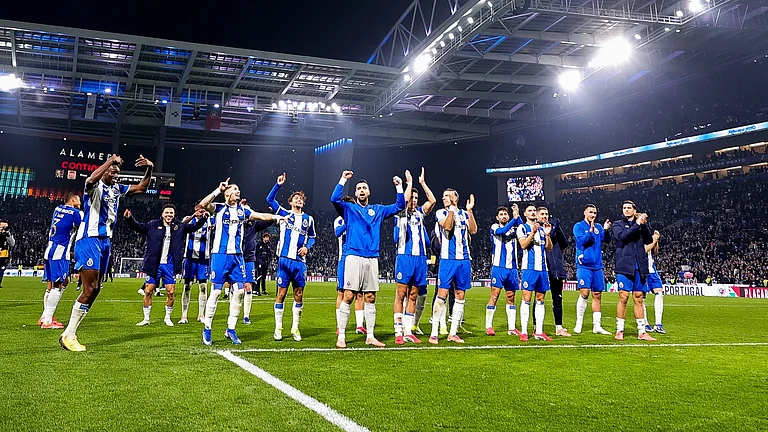"Greed is good."— Gordon Gekko, character in the movie Wall Street
SUDDENLY, the rumblings are everywhere. From South Korea to France, from Dalal Street to Wall Street, business ethics are under the microscope. Even as aSingapore court was sentencing Nicholas (Nick) Leeson to six-and-a-half years' imprisonment on two counts of cheating, 24 top South Korean industrialists were being interrogated for bribing politicians. In France, telecom giant Alcatel Alsthom's ex-chief Pierre Suard is under investigation for overbilling the company's biggest customer, France Telecom. In Germany, prosecutors are investigating 65 current and former employees of car maker Opel, who are alleged to have received illicit payments and favours from suppliers. In Italy, media czar and former prime minister Silvio Belusconi will stand trial next year on charges of bribing tax officials.
And Dalal Street spends its time pondering whether Reliance knowingly issued duplicate shares to Dhirubhai Ambani's personal physiotherapist.
Leeson, the 28-year-old Englishman who, through illegal sharemarket trading, wiped out the entire net worth of the UK-based Barings Group, has become somewhat of an icon of rogue business practices.Outlook has gained access to a report commissioned by Singapore's minister for finance and prepared by Price Waterhouse, which explains how Leeson did it. And the amazing part is that the more one understands how the caper was performed, the easier it seems. And the more frightening.
Leeson joined Barings Securities Ltd (BSL) in 1989 to work primarily in the settlements department. In early 1992, Leeson applied for registration as a dealer with the Securities and Futures Authority (SFA) in England. The SFA discovered in the application that Leeson had made a false statement that there were no unsatisfied judge-ment debts against him. The SFA queried BSL on the false statement and BSL eventually withdrew the application to the SFA.
In April 1992, Leeson was posted by BSL to Barings Futures Singapore Pte Ltd (BFS). The fact that SFA had denied his application for the dealership at SFA was not communicated to the Singapore International Monetary Exchange Ltd (SIMEX). It was envisaged that Leeson's trading role at BFS would be limited to the execution of orders placed by Barings Group companies elsewhere on behalf of external clients on SIMEX.
By the third quarter of 1993, Leeson was, however, trading on behalf of the Barings Group itself, known as proprietory trading. For his performance in 1993, he received a bonus of £115,000 (Rs 57 lakh) which was scheduled to have gone up to £450,000 (Rs 2.25 crore) for 1994.
As a proprietory trader, Leeson's principal activity was to arbitrage or to take the advantage of differences between the prices quoted for identical contracts on SIMEX on the one hand and on the Tokyo Stock Exchange or the Osaka Stock Exchange on the other ( see box ). Leeson was given certain intra-day risk limits by BSL. He was not permitted to maintain any overnight positions; that is, he had to square up everything by the close of the day.
But, greed is good. Expecting some scrips to go up the next day, instead of squaring up, he continued carrying forward till the next day and the day after and the day after. There were also no gross limits on the volume of arbitrage transactions that could be entered into by Leeson.
The "web of deceit", as the Singapore court has described it, appears to have started right from July 3, 1992, when almost immediately after BFS commenced trading on SIMEX as a clearing member, Leeson opened a trading account which he named Account 88888. The transactions booked in Account 88888 included some which had initially been transacted through other Barings Group accounts and were later transferred to Account 88888, and some which had been booked directly. The size of the positions in this account was large from the outset and grew quickly. "So large that when market prices moved unfavourably, it caused the collapse of the Barings Group," the report states.
The transactions in the account were also not hedged by matching positions. Prudent risk management demands that if you buy a certain amount of scrips, you should also hedge by taking a sell position on at least amajor part of the shares so that the actual cash exposure is low. The transactions in Account 88888 reflected losses from the very beginning, because Leeson consistently misread the market. Where transactions were transferred from other Barings Group accounts into 88888, this was often done in a way which artificially generated a profit for these other accounts to the detriment of 88888.
Leeson's solution to mounting losses was to keep upping the stakes, persistently hoping that he would be able to cover his losses with his next deal. By December 31, 1994, the losses had accumulated to Singapore $373.9 million (US$ 260 million) and by the time Barings collapsed in February this year, it had reached a monstrous S$ 2.2 billion (US$ 1.5 billion). Only S$ 100 million of this amount was funded by creditor banks; the remaining S$ 2.1 billion was by other Barings Group companies.
Leeson needed funds to finance the losses and margin deposits that had to be placed with SIMEX in respect of the transactions booked in Account 88888. The funds came from Barings Group companies. However, the Barings management has consistently contended that Account 88888 was an unauthorised account that it had no knowledge of. This obviously raises the question of how Leeson had obtained S$ 1.7 billion from the Barings Group without accounting for it.
ON February 20, 1995, just days before the collapse of the group, the need to reduce Leeson's positions was againraised at ALCO. Norris informed ALCO that he had discussed this issue with Leeson when they met in Singapore the previous week. Norris also informed ALCO that Leeson had suggested that his positions should not be reduced and that he (Norris) concurred with this. "Norris denied having had such a discussion with Leeson or having briefed ALCO in this way, but both facts were corroborated by independent witnesses," says the report. A number of witnesses gave evidence that Norris had a 60-90 minute meeting in private with Leeson in Singapore on February 16, 1995. Norris later confirmed the meeting though he claimed that he spent only three to five minutes talking to Leeson.
Also in January 1995, while conducting the annual audit of BFS' financial state-ments for the year ended December 31, 1994, BFS' external auditors, Coopers & Lybrand Singapore (C&L Singapore), discovered a discrepancy of 7.7 billion yen ($ 82 million) in the SIMEX yen settlement variation account. For two weeks, the auditors could not obtain a satisfactory explanation from Leeson for this discrepancy.
Finally, Leeson admitted to the auditors that this discrepancy represented a receivable due to BFS from Spear Leeds & Kellogg (SLK) in a transaction that he had brokered between SLK and Banque Nationale de Paris without any authorisation from his superiors. On being informed, Norris downplayed the significance of the matter and discouraged all independent investigations. At an ALCO meeting on February 8 which discussed the issue, Norris instructed that the minutes be kept brief and that further discussions on SLK should not be minuted.
In fact, there was no receivable due from SLK at all. It was a story that Leeson had cooked up and backed with forged papers which he submitted to C&L Singapore. In reality, the discrepancy represented part of the funds remitted by other Barings Group companies to BFS that Leeson had used to finance the losses and margin calls in transactions booked in Account 88888.
But why was Norris shielding Leeson? "A plausible motive can readily be conjectured," says the report. "Norris hadassumed leadership of the Barings Group after his predecessor had left BSL when it incurred losses of £11 million. In those circumstances, Norris clearly had an interest in concealing the much larger losses that the Barings Group had incurred via Account 88888 in the course of the three years that Leeson had been in Singapore.
"Whether the Barings Group management in fact knew of Account 88888 is hardly crucial. They could have remained ignorant of the account up to the time of the collapse only if they had persistently shut themselves from the truth. Norris' explanation after the collapse that the senior management of the Barings Group believed that Leeson's trading activities posed little or no risk to the Barings Group, but yielded very good returns, is implausible and, in our view, demonstrates a degree of ignorance of marketreality that totally lacks credibility. "
For three years, Account 88888 purportedly escaped the notice of the entire Barings Group management. Yet within hours after the group's senior management concluded that Leeson had fled ( see second box ), BSL personnel working in London and Singapore with incomplete documentation uncovered Account 88888 and identified it as the immediate cause of the collapse." The Barings crash clearly appears to be a lethal combination of one man's insatiable greed and his employer's cowardice.
Much good has of course come out of all this sordidness. Since the collapse of Barings, the Singapore Government and SIMEX have tightened supervision. Futures brokers are now required to be individually licensed by the Monetary Authority of Singapore. Also brought in place was a requirement that chief dealers of futures firms cannot be in charge of trade settlements, and that proprietory dealers do not handle customer business.
As Mukul Asher, associate professor of economics at the National University of Singapore, says:"Barings and other similar cases underline the need for international coordination in evolving rules of conduct in order to minimise such occurrences in the international financial system. " SEBI, SHCIL and Reliance, are you listening?


























